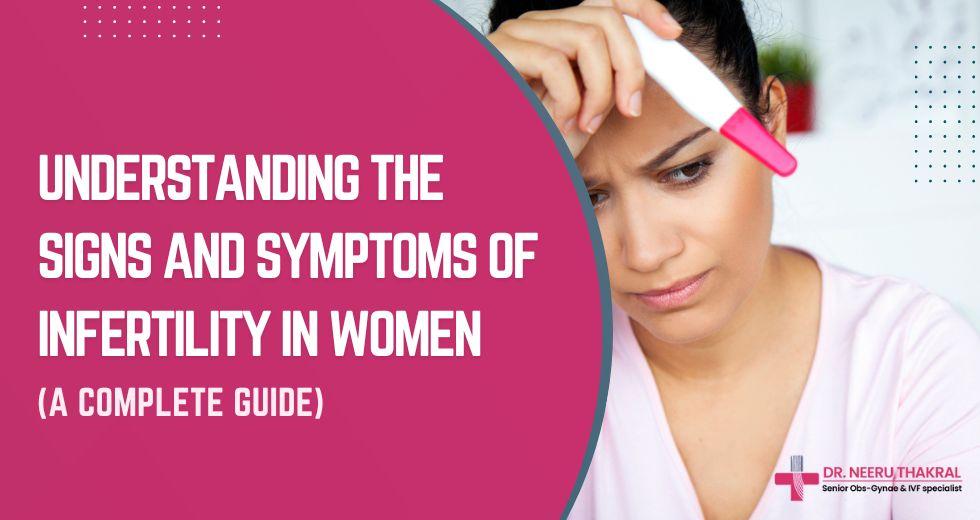
Understanding the Signs and Symptoms of Infertility in Women
Infertility can be a confusing and emotional experience for many women and couples. If you’re trying to get pregnant and it’s taking longer than expected, it’s normal to feel stressed or upset. Understanding the common signs of infertility can help you know when to talk to a doctor and what steps to take. In this blog, we’ll explain infertility in women in very simple words, so you can better understand what might be happening and how to get the right help.
What is Infertility?
Infertility means not being able to get pregnant after trying for one year. If a woman is over 35, doctors suggest seeking medical advice after six months of trying. Infertility can happen due to issues in the woman, the man, or both partners.
How Does Pregnancy Happen?
To understand infertility, it helps to know how a pregnancy begins:
-
A woman’s ovary releases an egg (called ovulation).
-
The egg travels through the fallopian tube.
-
Sperm from the male partner reaches the egg and fertilizes it.
-
The fertilized egg moves to the uterus and attaches to its lining.
If something goes wrong at any step, it can make it difficult to get pregnant.
Main Sign: Difficulty Getting Pregnant
The most common sign of infertility is not being able to conceive after one year of regular trying. However, there are other signs that may show something is affecting your ability to get pregnant.
Common Signs and Symptoms of Infertility in Women
1. Irregular Periods
A normal cycle usually lasts 21 to 35 days. If your periods come at different times each month, it could mean you’re not ovulating regularly.
Look for:
-
Periods that are too far apart or very close together
-
Missing periods for months
-
Not knowing when your next period will come
Irregular periods may be caused by PCOS, stress, being underweight or overweight, or hormonal issues.
2. No Periods at All
If your periods completely stop (called amenorrhea), it usually means you are not ovulating. This can happen due to hormone imbalances, extreme exercise, stress, or medical conditions.
3. Painful or Heavy Periods
Mild pain is normal during periods. But if you experience very painful cramps or excessive bleeding, it could be a sign of endometriosis – a condition where tissue similar to the uterus lining grows in the wrong places.
Other signs may include:
-
Ongoing pain in the lower stomach
-
Feeling weak or tired during periods
-
Pain when using the restroom during periods
-
Nausea or body aches
4. Changes in Menstrual Flow
If your period blood is very dark, pale, or the flow suddenly changes, it might indicate hormonal changes or other issues like endometriosis.
5. Hormonal Imbalance Signs
Hormones control your menstrual cycle. If they’re not balanced, you might notice:
-
Sudden weight gain or loss
-
Pimples or skin issues
-
Hair thinning or hair fall
-
Extra hair growth on the face or body
-
Low energy or feeling tired
-
Milky fluid from the nipples (when not feeding a baby)
These can point to conditions like PCOS or thyroid problems.
6. Discomfort During Close Physical Intimacy
Some women may feel discomfort or pain during close contact and may think it’s normal. But this can be a sign of internal problems such as inflammation, infections, or endometriosis, which can affect fertility.
7. Signs of Infections
Untreated infections in the reproductive system can lead to pelvic inflammatory disease (PID), which may cause scarring in the fallopian tubes, making it harder for the egg to meet the sperm.
Watch for:
-
Unusual vaginal discharge (white, yellow, or foul-smelling)
-
Pain in the lower stomach
-
Fever or feeling unwell
If you notice these symptoms, see a doctor right away.
8. Other Health Conditions
Some health problems that can affect your ability to conceive include:
-
Diabetes
-
Thyroid disorders
-
Being underweight or overweight
-
Autoimmune diseases
Managing these health issues with your doctor can improve your chances of pregnancy.
When Should You Visit a Doctor?
See a doctor if:
-
You’re under 35 and haven’t conceived after 1 year of trying
-
You’re 35 or older and haven’t conceived after 6 months
-
Your periods are missing, irregular, or very painful
-
You have a history of infections, surgery, or endometriosis
-
You notice sudden changes in weight, skin, hair, or discharge
A doctor can help find out the reason and offer the right treatment or guidance.
Common Causes of Infertility in Women
-
Ovulation problems – Not releasing eggs regularly due to PCOS, hormonal changes, or early menopause
-
Blocked fallopian tubes – Caused by infections, previous surgeries, or endometriosis
-
Problems with uterus or cervix – Like fibroids, polyps, or tissue abnormalities
-
Age factor – Fertility starts to decrease after age 35
What Can You Do to Improve Fertility?
If you notice any of these signs, don’t worry. Many women with these issues go on to have healthy pregnancies.
Here are some helpful steps:
-
Track your periods – Keep a record of your cycle and any unusual changes
-
Eat healthy and stay active – A good diet and regular activity help your body function better
-
Avoid smoking and alcohol
-
Manage stress – Practice relaxation and get enough sleep
-
See a doctor early – Early advice can help you take the right steps
Read More: Common Gynecological Problems Women Face and How to Treat Them
Final Thoughts
Infertility is more common than many people think, and there is no need to feel ashamed or alone. If you are facing difficulty getting pregnant or notice something unusual in your body, speak to a doctor.
Understanding the signs and symptoms of infertility is the first step toward getting answers, support, and care.
Content Created By:

Cyberbizz Technologies
Team - Content Creator